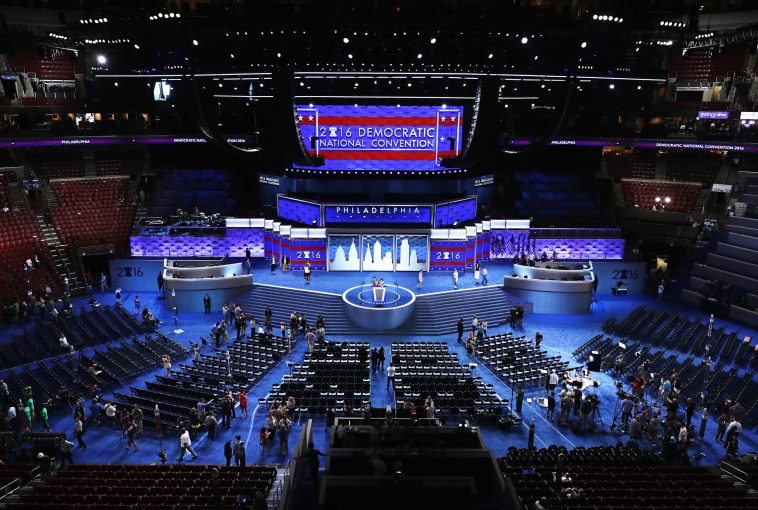Once upon a time, two decades ago, a freshly minted senator named Barack Obama conquered the Democratic convention with a speech that would catapult him to the presidency many years later. His electrifying reappearance on the political scene this week, almost a decade since he left the Oval Office, reminded us of the power that a well-crafted address can have, thrusting rising stars into the public consciousness and sparking nationwide discussions.
For those hoping to climb the political ladder, securing a spot on the speaker list of a national convention can be a significant career boost. It presents a unique opportunity to make an impression not only among the delegates present but also to a wider audience tuned in across the country. In this convention, an array of prominent individuals showed up to inspire, including those who had been considered for the vice presidency, followed by leaders of the house and senate.
Among the line-up were the perceived future generation of presidential hopefuls such as Josh Shapiro, the Pennsylvania Governor, Gretchen Whitmer, the Michigan Governor, and Pete Buttigieg, the established Transportation Secretary who made a bid for the presidency during the 2020 elections. While these platforms provide an avenue for politicians to bolster their national repute, these speeches also boost their image within the fraternal halls of Capitol Hill.
One figure who caught the attention of audiences early in the week was Texas Representative Jasmine Crockett. Despite being a newcomer to politics who experienced the whirlwind of internet celebrity during her first stint in Congress, Crockett was initially hesitant about stepping into the national limelight through such a showcase. However, she also acknowledged the significance of her participation.
She and her team were unable to find previous instances of a freshman black woman representative gaining the stage during prime time in recent history. Meanwhile, Representative Alexandria Ocasio-Cortez, who has been a prominent figure since her unexpected primary victory over Representative Joe Crowley in 2018, was the single member of the so-called ‘squad’ to secure a slot this week.
Lateefah Simon, a California-based organizer, and social justice advocate, even though she hasn’t won her political office yet, won prime-time airtime on Wednesday night. Known for her influential work with Vice President Kamala Harris in the San Francisco district attorney’s office years ago, Simon is tipped to occupy the House seat given up by Representative Barbara Lee who is now running for the Senate.
Simon was charged with painting a picture of her friend and mentor, Kamala Harris, as a compassionate and trusted prosecutor who works closely with crime victims. This high-profile opportunity left the members of the California delegation enthused and filled with pride. Comments such as ‘she was vigorous and eloquent’ from a delegate exemplified the collective sentiment.
An attorney hailing from Mobile, Alabama, Shomari Figures who had worked in the administrations of Obama and Biden, also got his moment to shine on the main stage that Thursday night. Figures, a candidate for an open House seat, used his allocated time of 2 minutes and 38 seconds to pay tribute to district’s civil rights icons, from Rosa Parks to John Lewis.
Justin Pearson, a state representative from Tennessee, may have had a shorter spotlight moment, but his impact reverberated deeply on X, formerly known as Twitter, and Instagram. Delivering the state’s delegate roll call, he delivered a passionate plea for social justice and gun control. He is part of the ‘Tennessee Three’ together with lawmakers Gloria Johnson and Justin Jones.
The trio gained nationwide attention in 2023 following their expulsion from the state House chamber after a protest against gun control in the wake of a school shooting. Despite this, they were quickly re-elected in a resurgent show of popular approval. Their unique stance has made them popular figures at events associated with the convention, such as delegate breakfasts and mobilizing caucuses.
Another standout convention speaker was Maryland Governor Wes Moore. Luz Bay, a delegate from New Hampshire, commended Moore’s poignant remarks at the United Center and a delegate breakfast the following morning. She admired how Moore, as a potential president, seemed to embody lived experiences shared with many Americans, offering a refreshing contrast to detached elites.
Angela Alsobrooks, running for Senate in Maryland, also delivered a powerful address to the convention. Relatively unknown on a national level, her address served to draw attention to her senate campaign. Alsobrooks also expressed her admiration for Kamala Harris, linking her own struggles to the capacities Harris possesses which Alsobrooks described as ‘inspirational’.
She recalled the story of how she was running for the post of the state attorney in Prince George’s County and how she was inspired by the techniques to combat crime which Harris, the then district attorney of San Francisco, had mooted in an article in Essence magazine. In a twist of fate, following her election victory, Harris called her personally to congratulate her and offer assistance in any form.
The convention also marked an opportunity for candidates running for Senate to flaunt their capabilities. Many commentators remarked that the convention underlined the vast array of talented upcoming politicians within the Democratic party. ‘The bench of the party is strong,’ commented Kelly Dietrich, head of the National Democratic Training Committee, indicative of a bright future for the party.
Anecdotes such as these serve to demonstrate the potential launching pad that a party convention speech can provide for politicians looking to broaden their appeal nationally. They also go a long way in humanizing abstract political figures as well as fostering greater appreciation for their personal experiences and the causes that they champion.
While the act of speechmaking might seem like a routine part of a politician’s repertoire, the reality is that conventions have the power to transform the trajectory of individual careers, as Barack Obama can attest. As such, every sentence uttered, every story told, and every idea introduced could ultimately be the defining moment in a politician’s career.


